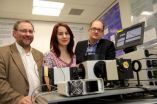Parasite strategy offers insight to help tackle sleeping sickness
Fresh insight into the survival strategy of the parasite that causes sleeping sickness could help inform new treatments for the disease
2011-04-24
(Press-News.org) Fresh insight into the survival strategy of the parasite that causes sleeping sickness could help inform new treatments for the disease.
Scientists have found that the parasite, which can transform itself into either of two physical forms, has developed a careful balance between these. One of these types ensures infection in the bloodstream of a victim, and the other type is taken up by the tsetse fly and spread to another person or animal.
The parasite maintains a trade-off between maintaining enough parasites to beat off the immune response and cause infection, and ensuring sufficient parasites to enable the spread of the disease.
Researchers at the University of Edinburgh, who carried out the study, used a combination of biological and mathematical techniques to show how the parasite balances production of each of the forms as it causes an infection. Their results enable fresh understanding of how the parasite reacts to its surroundings to ensure its survival in the short term as well as the long-term spread of the disease.
Sleeping sickness, which is spread by the bite of the tsetse fly, affects some 30,000 people in sub-Saharan Africa. Many millions more are considered to be at risk. The disease affects people and animals and without treatment is considered fatal.
The research, funded by the Wellcome Trust, was published in the journal Cell Host and Microbe.
Professor Keith Matthews of the University of Edinburgh, who led the study, said: "Sleeping sickness parasites alter their form in order to ensure their survival and spread. We hope that, having discovered more about how these parasites behave, we will be able to develop ways of interfering with their survival strategy and interrupt the spread of this disease."
INFORMATION: END
ELSE PRESS RELEASES FROM THIS DATE:
2011-04-24
The positive effects of mindfulness meditation on pain and working memory may result from an improved ability to regulate a crucial brain wave called the alpha rhythm. This rhythm is thought to "turn down the volume" on distracting information, which suggests that a key value of meditation may be helping the brain deal with an often-overstimulating world. Researchers from Massachusetts General Hospital (MGH), Harvard Medical School and the Massachusetts Institute of Technology report that modulation of the alpha rhythm in response to attention-directing cues was faster ...
2011-04-24
Church attendance in western democracies has declined; yet, a new University of Missouri study shows religious beliefs still influence people at the polls.
Chris Raymond, a graduate instructor of political science in the MU College of Arts and Science, said that many political experts consider voters around the world as "floating without party loyalties," and that religion does not influence voters. Raymond's new study says religion still has a large impact on how people vote and helps define many of the platforms represented in the party system.
In the study, Raymond ...
2011-04-24
ANN ARBOR, MICH. -- A Data and Safety Monitoring Committee (DSMC) has determined that patients in a phase III clinical trial given atrasentan in addition to a standard chemotherapy regimen for advanced prostate cancer did not have longer survival or longer progression-free survival than patients on the same chemotherapy regimen who got a placebo rather than atrasentan.
Almost 1,000 patients who had advanced, hormone-refractory prostate cancer were given up to 36 weeks of chemotherapy with docetaxel and prednisone. These patients were randomized so that one half got an ...
2011-04-24
Acupuncture provides long-lasting relief to hot flashes, heart palpitations and anxiety due to side effects of the hormone given to counteract testosterone, the hormone that induces prostate cancer, according to a study published in the April issue of the International Journal of Radiation Oncology•Biology•Physics, an official journal of the American Society for Radiation Oncology (ASTRO).
The main treatments for men with metastatic prostate cancer are either surgery or hormone therapy to significantly reduce the level of testosterone in the body. Eliminating testosterone ...
2011-04-24
A discovery by Johns Hopkins scientists about how a single-celled fungus survives in low-oxygen settings may someday help humans whose immune systems are compromised by organ transplants or AIDS.
A report on the discovery in a yeast called Schizosaccharomyces pombe appears April 22 in Molecular Cell.
Previous work by the Hopkins team showed that Schizosaccharomyces pombe, a model organism that's often used to study individual genes, contains a protein named Sre1 that allows the organism to adapt to conditions in which oxygen is very low or missing altogether.
To find ...
2011-04-24
Berkeley, CA– New research by the U.S. Department of Energy's (DOE) Lawrence Berkeley National Laboratory finds strong evidence that homes with solar photovoltaic (PV) systems sell for a premium over homes without solar systems.
"We find compelling evidence that solar PV systems in California have boosted home sales prices," says the lead author Ben Hoen, a researcher at Berkeley Lab. "These average sales price premiums appear to be comparable with the average investment that homeowners have made to install PV systems in California, and of course homeowners also benefit ...
2011-04-24
April 21, 2011 − (BRONX, NY) − Researchers at Albert Einstein College of Medicine of Yeshiva University have for the first time observed the activity of a single gene in living cells. In an unprecedented study, published in the April 22 online edition of Science, Einstein scientists were able to follow, in real time, the process of gene transcription, which occurs when a gene converts its DNA information into molecules of messenger RNA (mRNA) that go on to make the protein coded by the gene.
Robert Singer, Ph.D., co-director of the Gruss Lipper Biophotonics ...
2011-04-24
According to a new study, severely obese adolescents are no more likely to be depressed than normal weight peers. The study, which has been released online in the Journal of Adolescent Health, did find that white adolescents may be somewhat more vulnerable to psychological effects of obesity.
This three-year study – performed by researchers from the Center for Child and Adolescent Health Policy at MassGeneral Hospital for Children (MGHfC) and the Department of Public Health and Community Medicine at Tufts Medical School – analyzed the relationship between severe obesity ...
2011-04-24
CAMBRIDGE, Mass. -- In the arid Namib Desert on the west coast of Africa, one type of beetle has found a distinctive way of surviving. When the morning fog rolls in, the Stenocara gracilipes species, also known as the Namib Beetle, collects water droplets on its bumpy back, then lets the moisture roll down into its mouth, allowing it to drink in an area devoid of flowing water.
What nature has developed, Shreerang Chhatre wants to refine, to help the world's poor. Chhatre is an engineer and aspiring entrepreneur at MIT who works on fog harvesting, the deployment of devices ...
2011-04-24
Scientists at the University of Strathclyde in Glasgow are developing a technique based on a new discovery which could pave the way towards detecting Alzheimer's disease in its earliest stages - and could help to develop urgently-needed treatments.
The technique uses the ratio of detected fluorescence signals to indicate that clusters of peptide associated with the disease are beginning to gather and to have an impact on the brain.
Current techniques are not able to see the peptide joining together until more advanced stages but a research paper from Strathclyde describes ...
LAST 30 PRESS RELEASES:
[Press-News.org] Parasite strategy offers insight to help tackle sleeping sickness
Fresh insight into the survival strategy of the parasite that causes sleeping sickness could help inform new treatments for the disease

